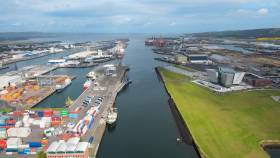Displaying items by tag: DUP trade figures
Brexit: DUP Silent On '72 Per Cent' Trade Claim Out of Belfast Harbour
#DUPtradefigures - The Democratic Ulster Party (DUP) has been unable to substantiate its "72 per cent" statistic in relation to trade between Northern Ireland and Britain.
As The Irish News writes, for months the party has been using the figure to support its arguments against calls for an Irish Sea border post-Brexit.
DUP leader Arlene Foster has said "72 per cent of trade from Belfast Harbour is with Great Britain", while deputy leader Nigel Dodds has said Britain "is the primary marketplace for local produce, accounting for over 72 per cent of trade flows".
However, when asked to explain the exact meaning of the figure and provide its source, the party did not respond.
It has also emerged that official government statistics differ significantly from numbers used by Conservative MP Owen Paterson in his claims that trade between the UK and Republic is "really quite small".
The former secretary of state, an adviser to the Leave Means Leave campaign group, told BBC Radio 4's Today programme: "It's five per cent of Northern Ireland exports. It's 1.6 per cent of the Republic of Ireland's exports."
According to Northern Ireland Statistics and Research Agency (Nisra) figures, sales to the Republic actually account for 16 per cent of Northern Ireland's external sales.
Sales to Britain make up 58 per cent, according to the statistics for 2015 which include services and tourism. The rest of the EU is nine per cent, and 17 per cent for sales to the rest of the world.
It appears Mr Paterson's five per cent figure actually represents sales to the Republic as a proportion of Northern Ireland's overall internal and external sales activity.
Although it has been used in different ways, the DUP's figure appears to only relate to trade directly through Belfast Harbour, rather than the north's overall external sales or exports.
When asked about the claim, Belfast Harbour declined to give a formal response.
For more on the story, click the newspaper's report here.
























































